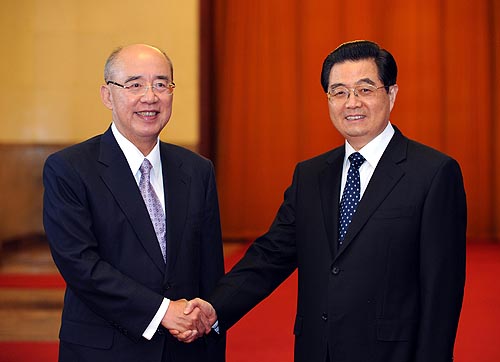|
 |
|
HIGH-LEVEL HANDSHAKE: Hu Jintao (right), General Secretary of the Communist Party of China Central Committee, meets with Kuomintang Chairman Wu Poh-hsiung during his eight-day mainland visit on May 26 (RAO AIMIN) |
Fruitful Meeting
Hu Jintao, General Secretary of the Communist Party of China Central Committee, met with visiting Kuomintang Chairman Wu Poh-hsiung in Beijing on May 26, achieving "important progress" on cross-Straits issues.
The two agreed to further implement the common prospects for peaceful cross-Straits development, agreed by leaders of the two parties in 2005, according to a statement issued after their meeting.
Both sides will maintain the political foundation that they oppose "Taiwan independence" and stick to the 1992 Consensus, the statement said. They will work to intensify mutual trust.
They will begin talks about the economic cooperation agreement as early as possible and promote exchanges between culture and education sectors on both sides, it said.
Facilitating Investment
China will ease government controls this year to stimulate private-sector investment amid the economic slowdown, a top economic planner said in a statement on May 25.
The government will narrow the scope of projects requiring approval "by the maximum extent," the National Development and Reform Commission said in its annual plan on deepening economic reforms, which has been approved by the State Council.
The power of approval will also be transferred to lower government levels to spur private investment.
The government encourages the use of non-governmental capital in such key sectors as petroleum, railways, power generation, telecommunications and public facilities.
School Inspections
The Chinese Government will finish an inspection of all the country's primary and secondary schools by the end of October, an official with the Education Ministry said on May 21.
The goal is to find safety flaws in school buildings, said Tian Zuyin, Deputy Director with the ministry's Finance Department, in an interview posted on the Central Government's online portal.
When the inspection of all 388,000 schools is complete, the ministry will announce which ones need to be reconstructed or reinforced.
The three-year nationwide school inspection began on May 8 to improve school buildings' ability to withstand natural disasters such as earthquakes, landslides, floods and typhoons.
The Central Government will appropriate at least 24 billion yuan ($3.9 billion) over the next three years to support the reinforcement of school buildings in earthquake-prone areas.
Plastic Free
Registered retailers in Hong Kong are required to charge customers no less than 0.5 HK dollars ($0.06) for each shopping bag from July 7 this year, Hong Kong's top environmental official said on May 24.
Edward Yau, Secretary for the Environment in the Hong Kong Special Administrative Region, made the remarks while officiating the launch ceremony of the "Environmental Levy Scheme on Plastic Shopping Bags" publicity campaign.
He called on people to take their own bags instead of using plastic shopping bags, saying he was confident that Hong Kong would be able to reduce the local consumption of plastic shopping bags by billions within a year.
Dog Ban Backtracks
Heihe City in northeast China's Heilongjiang Province began to solicit public opinion on dog management on May 25, after the city suspended a plan to get rid of all dogs in urban areas and four suburban villages.
Under a draft rule published in the local newspaper Heihe Daily, each urban household may keep one dog. Large or aggressive dogs are banned from urban areas.
The proposed total ban, which was issued May 20 and was to have taken effect May 23, was not implemented at all due to strong opposition from local residents and fierce debate in the media.
| 